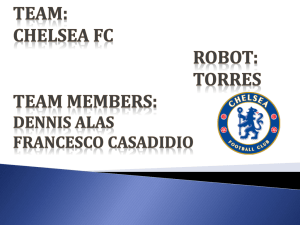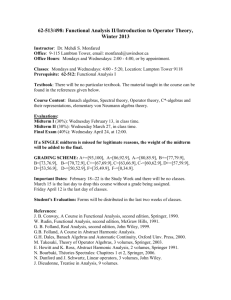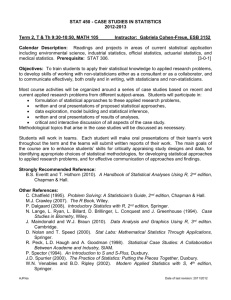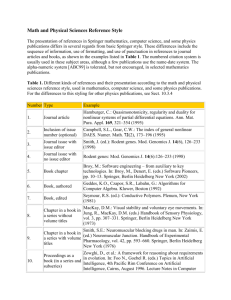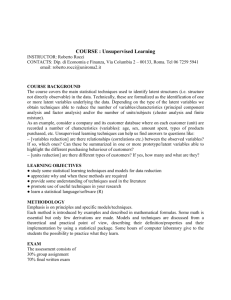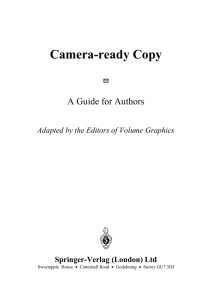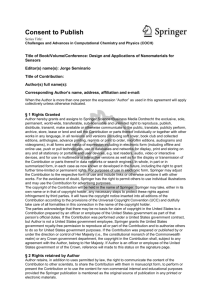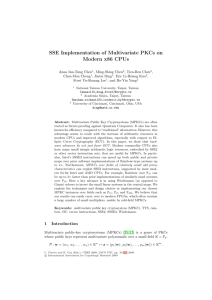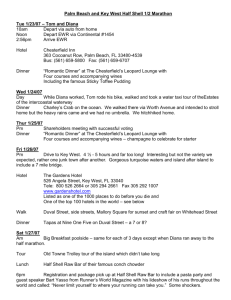M2-IFL en 2014-2015 Fiches et Exposés de méthodologie
advertisement
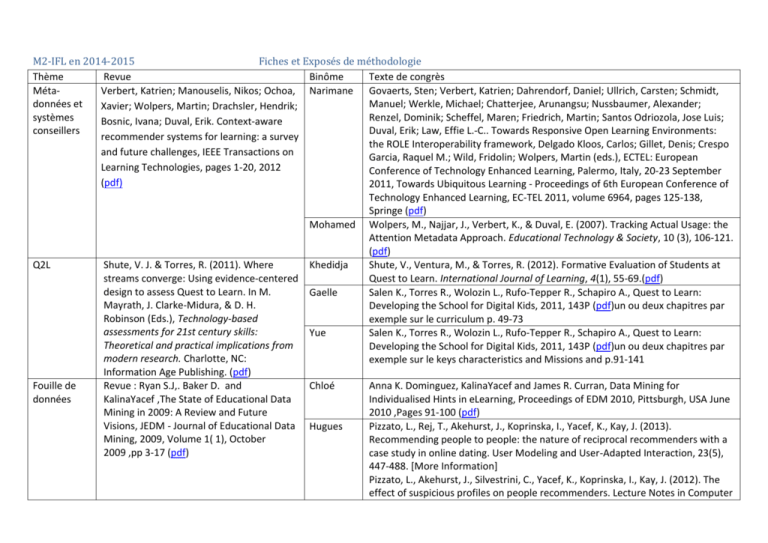
M2-IFL en 2014-2015 Fiches et Exposés de méthodologie Thème Revue Binôme Texte de congrès MétaVerbert, Katrien; Manouselis, Nikos; Ochoa, Narimane Govaerts, Sten; Verbert, Katrien; Dahrendorf, Daniel; Ullrich, Carsten; Schmidt, données et Manuel; Werkle, Michael; Chatterjee, Arunangsu; Nussbaumer, Alexander; Xavier; Wolpers, Martin; Drachsler, Hendrik; systèmes Renzel, Dominik; Scheffel, Maren; Friedrich, Martin; Santos Odriozola, Jose Luis; Bosnic, Ivana; Duval, Erik. Context-aware conseillers Duval, Erik; Law, Effie L.-C.. Towards Responsive Open Learning Environments: recommender systems for learning: a survey the ROLE Interoperability framework, Delgado Kloos, Carlos; Gillet, Denis; Crespo and future challenges, IEEE Transactions on Garcia, Raquel M.; Wild, Fridolin; Wolpers, Martin (eds.), ECTEL: European Learning Technologies, pages 1-20, 2012 Conference of Technology Enhanced Learning, Palermo, Italy, 20-23 September (pdf) 2011, Towards Ubiquitous Learning - Proceedings of 6th European Conference of Technology Enhanced Learning, EC-TEL 2011, volume 6964, pages 125-138, Springe (pdf) Mohamed Wolpers, M., Najjar, J., Verbert, K., & Duval, E. (2007). Tracking Actual Usage: the Attention Metadata Approach. Educational Technology & Society, 10 (3), 106-121. (pdf) Q2L Shute, V. J. & Torres, R. (2011). Where Khedidja Shute, V., Ventura, M., & Torres, R. (2012). Formative Evaluation of Students at streams converge: Using evidence-centered Quest to Learn. International Journal of Learning, 4(1), 55-69.(pdf) design to assess Quest to Learn. In M. Gaelle Salen K., Torres R., Wolozin L., Rufo-Tepper R., Schapiro A., Quest to Learn: Mayrath, J. Clarke-Midura, & D. H. Developing the School for Digital Kids, 2011, 143P (pdf)un ou deux chapitres par Robinson (Eds.), Technology-based exemple sur le curriculum p. 49-73 assessments for 21st century skills: Yue Salen K., Torres R., Wolozin L., Rufo-Tepper R., Schapiro A., Quest to Learn: Theoretical and practical implications from Developing the School for Digital Kids, 2011, 143P (pdf)un ou deux chapitres par modern research. Charlotte, NC: exemple sur le keys characteristics and Missions and p.91-141 Information Age Publishing. (pdf) Fouille de Revue : Ryan S.J,. Baker D. and Chloé Anna K. Dominguez, KalinaYacef and James R. Curran, Data Mining for données KalinaYacef ,The State of Educational Data Individualised Hints in eLearning, Proceedings of EDM 2010, Pittsburgh, USA June Mining in 2009: A Review and Future 2010 ,Pages 91-100 (pdf) Visions, JEDM - Journal of Educational Data Hugues Pizzato, L., Rej, T., Akehurst, J., Koprinska, I., Yacef, K., Kay, J. (2013). Mining, 2009, Volume 1( 1), October Recommending people to people: the nature of reciprocal recommenders with a 2009 ,pp 3-17 (pdf) case study in online dating. User Modeling and User-Adapted Interaction, 23(5), 447-488. [More Information] Pizzato, L., Akehurst, J., Silvestrini, C., Yacef, K., Koprinska, I., Kay, J. (2012). The effect of suspicious profiles on people recommenders. Lecture Notes in Computer Evaluation sur plateforme Annie Christal Island Apprendre avec des SG Villasclaras-Fernández, E., Hernández-Leo, D., Asensio-Pérez, J. I., & Dimitriadis, Y. (2013). Web Collage: An implementation of support for assessment design in CSCL macro-scripts. Computers & Education.67(2013) 79-57 (pdf) Thomas, J. M., & Young, R. M. (2010). Annie: Automated generation of adaptive learner guidance for fun serious games. Learning Technologies, IEEE Transactions on, 3(4), 329-343. (pdf) Mathieu J. Rowe, L. Shores, B. Mott, and J. Lester. Integrating Learning, Problem Solving, and Engagement in Narrative-Centered Learning Environments. International Journal of Artificial Intelligence in Education, IJAIED 21 (2), 2011, 115-133, (pdf) Allan Girard, C., Ecalle, J., & Magnan, A. (2013). Serious Games as new educational tools: how effective are they? A meta-analysis of recent studies. Journal of Computer Assisted Learning, 29(3), 207-219 (pdf) Martine Taoufik Allan Lotfi Lotfi Sylvaine Science (LNCS), 7379, 225-236. [More Information] Akehurst, J., Koprinska, I., Yacef, K., Pizzato, L., Kay, J., Rej, T. (2012). Explicit and Implicit User Preferences in Online Dating. 15th Pacific-Asia Conference on Knowledge Discovery and Data Mining, PAKDD 2011, Heidelberg, Germany: Springer Santos, P.; Pérez-Sanagustín, M.; Hernández-Leo, D.; Blat, J. QuesTInSitu: From Tests To Routes For Assessment In Situ Activities, Computers & Education, 57(4), 2011, p. 2517-2534. (pdf) Navarrete, T.; Santos, P.; Hernández-Leo, D.; Blat, J. QTIMaps: A model to enable web maps in assessment. Educational Technology & Society 14(3), 2011, p. 203217.(pdf)) Thomas, J. M., & Young, R. M. (2011, January). Dynamic guidance for task-based exploratory learning. In Artificial Intelligence in Education (pp. 369-376). Springer Berlin Heidelberg. [pdf]. Thomas, J. M., & Young, R. M. (2010, January). Annie: a tutor that works in digital games. In Intelligent Tutoring Systems (pp. 417-419). Springer Berlin Heidelberg. [PDF] Scott McQuiggan, Jonathan Rowe, Sunyoung Lee, and James Lester. Story-Based Learning: The Impact of Narrative on Learning Experiences and Outcomes. In Proceedings of the Ninth International Conference on Intelligent Tutoring Systems, Montreal, Canada, pp. 530-539, 2008. (pdf) Joseph F. Grafsgaard, Kristy Elizabeth Boyer, and James C. Lester. Toward a Machine Learning Framework for Understanding Affective Tutorial Interaction, Proceedings of the 11th International Conference on Intelligent Tutoring Systems, ITS 2012,Springer (pdf) Sitzmann, T. (2011). A meta-analytic examination of the instructional effectiveness of computer-based simulation Games. Personnel Psychology, 64(2), 489–528. (pdf) Michael F. Young, Stephen Slota, Andrew B. Cutter, Gerard Jalette, Greg Mullin, Benedict Lai, Zeus Simeoni, Matthew Tran and Mariya Yukhymenko, A Review of Trends in Serious Gaming Review of Educational Research September 2012 82: 296-299 (pdf)
